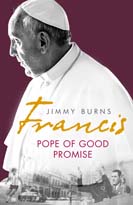I cannot recall ever having been present in a congregation that greeted a sermon by a Catholic priest with more deserving spontaneous applause, not in England at least.
But applause was what Fr William Pearsall the Jesuit priest at the Church of the Immaculate Conception, Farm Street got this Sunday after speaking with sensitivity and wisdom about the upcoming Papal visit.
Fr William began by telling us how a day earlier he had opened his office window and listened to the raucous song emanating from nearby Hyde Park. He heard the sound of a large crowd delivering a passionate rendition of Rule Brittania followed by God Save the Queen.
His first reaction was an apprehensive one. Were these the strains emanating from some extreme nationalist faction, still worse the early stirring of the anti-brigade, preparing themselves to confront the visit later this week of Pope Benedict XV1?
Was this a prejudiced identification of Britishness of the kind that for centuries had excluded a Catholic minority from the mainstream of public life on the basis that a Catholic’s loyalties were not be trusted?
Back in 1780 thousands heeded the call of Lord George Gordon, the head of the Protestant Association, and took to the streets of London in an outburst of anti-Catholic feeling. The so-called Gordon riots, prompted by the repeal of the more extreme laws discriminating against Roman Catholics in the UK, led to the ransacking of churches and Catholics homes. Over 280 rioters were shot dead when the army intervened. This was the Age of Enlightenment, the ‘age of tolerance’ and yet this went down in the history books as the most destructive uprising to take place in the English capital in the 18th century.
Fr William checked the Hyde Park gathering and discovered that it was the last night of the Proms, a musical celebration with no threat, implicit or otherwise to Catholics who had an inclusive sense of their Britishness, which cut across class and race and partisan politics.
He recalled then how prior to becoming a priest, as a younger man, he had been an atheist. For him four words had summed up all that could go wrong with the human race on account of religion: superstition, fear, bigotry, and ignorance. He was to learn later what he now knows that the worst manifestations of all four lie outside religion, not within.
Which is why he was asking his fellow parishioners to look forward to the papal visit from a position not of defensiveness but of affirmation. Their ethnicity was one that could reach out to others, rather than seek to impose itself in a militaristic or triumphalist manner.
Against those who sought to denigrate the figure of the Pope, with an oedipal rejection of the Father figure, the Papa, Catholics could draw energy and inspiration from the foundation of the Christian Church with the words of Christ telling his unconditionally loyal, and very human apostle, ‘Thou art Peter, and upon this Rock I shall build my Church and the gates of hell shall not prevail against thee.’
Catholics have endured history. Not even a million twitters of anti-Popery should be allowed to spoil the good that can come from the Pope’s visit. Fr William’s prayer was that, like the prodigal son, those who thought themselves dead, will come alive later this week, not in superstition, fear, bigotry and ignorance, but in love based on substantive thought. Amen to that.


Comments